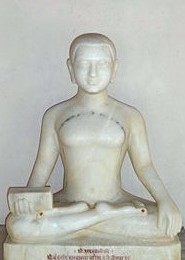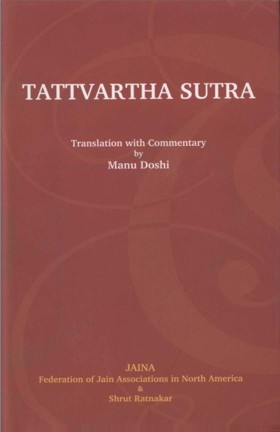07.18 Shankākankshāvichikitsā'nyadrashtiprashansa-sanstavāh Samyagdrasteraticharāh
Audio: Sanskrit: शंकाकांक्षाविचिकित्साsन्यदृष्टिप्रशंशासंस्तवाःसम्यग्दृष्टेरतिचाराः।
Hindi: शंका,कांक्षा,विचिकित्सा,अन्यदृष्टि प्रसंशा और अन्यदृष्टिसंस्त्व ये पांच सम्यग् दर्शन के अतिचार है।
07.18
English: Doubtfulness, expectations, wavering mind, praising the wrong viewpoint and adoration thereof are the five transgressions of right perception.
Samyaktva (right perception) is considered a prerequisite for observance of restraints. This sutra therefore specifies its transgressions. In order to comprehend Samyaktva we need to have a clear concept of the term. Basically it means the right way of perceiving and understanding any object or situation. Soul, for instance, is everlasting and is imbibed with knowing capability. Having firm faith in existence of the eternal soul and in its knowing property is therefore the basis of right perception. Since soul is shapeless and formless, it cannot be the subject of senses. In other words, it is not possible to experience the soul by any sense organ. Faith has therefore to be initially laid on what the knowledgeable guides state about it. Thereafter one has to contemplate over it. By repeatedly contemplating and meditating over its true nature one can come to a state where he can directly experience the soul.
When one knows the soul at the experiential level, his perception would be as clear as that of the omniscient Lords. As such, there remains no scope for retaining any doubt about it. Prior to that the knowledge of soul is gained from the preceptors or from the books. There is therefore scope for doubt. Such doubtfulness is termed as Shankā, which is the first transgression of Samyaktva. Shankā is generally interpreted as raising doubts about the scriptural precepts. Jainism, however, does not forbid raising doubts. Actually it exhorts to question repeatedly till all the doubts are removed. What it forbids is to retain any doubt.
With the faith in right perception, one tends to behave in the right direction. His objective would be to remain true to that perception. But remaining tuned to the soul is not possible at the lower levels. The aspirant therefore needs to get involved in wholesome activities. Thereby he earns the wholesome Karma. That in turn leads to the favorable situations in this life as well as in the life hereafter. But at times the aspirant starts expecting such benefits as the consequence of right perception. To maintain such expectation is termed as Kānkshā, which is the second transgression of Samyaktva.
In spite of faith in existence of soul, when an aspirant is exposed to a different concept with a strong logic and motivation, his faith may swerve. He may be induced to think that the viewpoint presented to him could be right. He does not necessarily give up the right viewpoint, but his mind may start wavering. That wavering is termed as Vichikitsā, which is the third transgression of Samyaktva.
At times the different viewpoint is so strongly presented that the aspirant may be impressed and be overcome thereby. As such, he may be led to praise and/or adore that viewpoint. Such praising and adoring the wrong viewpoint constitute the fourth and fifth transgressions of Samyaktva.
 Acharya Umaswati
Acharya Umaswati
